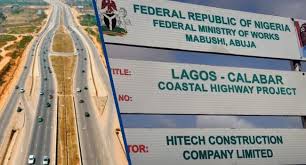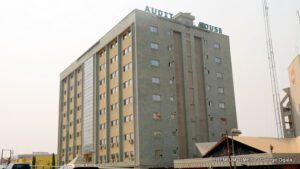


Over 100 land owners prepare for legal war over demolitions for Lagos-Calabar coastal highway
Over 100 property owners in the Lafiaji community, situated in the Eti-Osa Local Government Area of Lagos State, are preparing to take legal action against the Federal Government. They have received demolition notices demanding they vacate their properties to make way for the construction of the Lagos-Calabar Coastal Highway.
This development was highlighted in a statement issued on Tuesday, titled “Text of a Press Conference by Property Owners and Residents of Lafiaji Community, Eti-Osa Local Government Area, Lagos State on the Distortion in the Construction of the Lagos-Calabar Coastal Highway Due to Arbitrary Deviations from the Established Right of Way by the Honourable Minister of Works and the Threatened Unlawful Demolition of Their Properties in Lafiaji Community.”
The statement accuses David Umahi, the Minister of Works, of altering the original right of way to protect influential politicians. According to the property owners, they had adhered to proper procedures when acquiring their land and developing their properties. They were informed of the established right of way for the highway and ensured that their developments did not encroach upon it.
The statement further explains that the property owners had obtained all necessary approvals from the Lagos State Government, including deeds, survey plans, and building permits. However, they allege that some individuals have built unauthorized estates on the right of way using either invalid titles or manipulated documents, facilitated by corrupt officials.
The statement also criticizes the recent visit by the Honourable Minister of Works and the Federal Controller of Works, who allegedly ordered a deviation from the original right of way. This new alignment reportedly affects the Lafiaji community, contrary to the long-established right of way.
The Lagos-Calabar Coastal Highway project, intended to connect Lagos to Cross River while passing through several states, is essential for improving connectivity and economic activity in Nigeria’s coastal region. The project is estimated to cost N4 billion per kilometer, with contracts awarded for less than 100 kilometers of the road totaling N2.46 trillion.
Since construction began in March, the project has faced public scrutiny and controversy. In May, Umahi announced that 750 houses along the route were marked for demolition. However, many property owners have found the compensation offered to be insufficient, with some arguing it does not reflect their investments. Olanrewaju Ojo, founder of Leisure Games, criticized the compensation, stating that it equates to what he could earn in a week.
Critics have also questioned the transparency of the procurement process, claiming that the contract award was shrouded in secrecy. The affected residents have written protest letters to President Bola Tinubu and Lagos State Governor Babajide Sanwo-Olu, seeking redress.
Despite these efforts, the community’s relief was short-lived as officials from the Federal Ministry of Works continued marking properties for demolition. The residents conducted investigations and discovered that the Minister of Works had ignored presidential directives to adhere to the original right of way.
The statement accuses the Minister of Works of nepotism, alleging that valuable properties owned by politically connected individuals were spared from demolition, prompting the redirection of the highway’s alignment through the Lafiaji community. The residents assert that this deviation and the subsequent labeling of their properties as “shanties” to justify the changes constitute an abuse of power.
The community’s legal representative, Jiti Ogunye, acknowledged the challenges of pursuing legal action due to the complexities of the judicial system but expressed a commitment to fighting for justice.
Currently, the Federal Ministry of Environment is conducting a 21-day public display of the Environmental and Social Impact Assessment (ESIA) report for Section 1 of the Lagos-Calabar Coastal Highway project, which spans from 0km to 47.5km in Lagos. This assessment is crucial for addressing potential environmental and social impacts and ensuring compliance with international and Nigerian regulations.
The ESIA aims to evaluate and mitigate negative impacts on the environment and society while supporting the project’s sustainable development. The report will also guide the preparation of a Resettlement Action Plan to address any involuntary resettlement resulting from the highway’s construction



